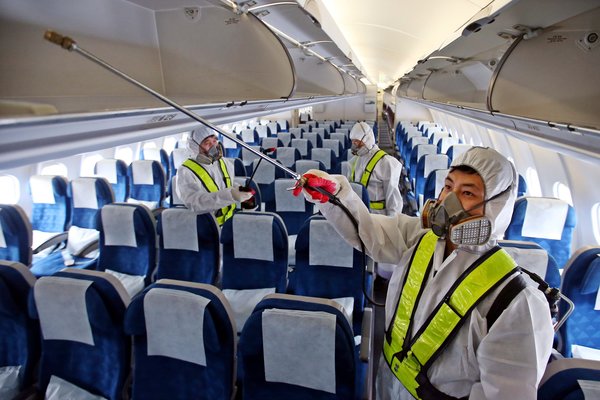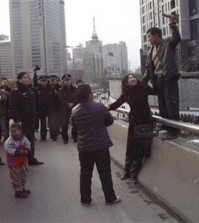- California Assembly OKs highest minimum wage in nation
- S. Korea unveils first graphic cigarette warnings
- US joins with South Korea, Japan in bid to deter North Korea
- LPGA golfer Chun In-gee finally back in action
- S. Korea won’t be top seed in final World Cup qualification round
- US men’s soccer misses 2nd straight Olympics
- US back on track in qualifying with 4-0 win over Guatemala
- High-intensity workout injuries spawn cottage industry
- CDC expands range of Zika mosquitoes into parts of Northeast
- Who knew? ‘The Walking Dead’ is helping families connect
S. Korean MERS patient in China ‘still in serious condition’

Workers wearing protective gears spray anti-septic solution in an airplane amid rising public concerns over the spread of MERS, Middle East Respiratory Syndrome, at Incheon International Airport in Incheon, South Korea Friday, June 5, 2015. Sales of surgical masks surge amid fears of the deadly, poorly understood virus. Airlines announce “intensified sanitizing operations.” More than 1,100 schools close and 1,600 people – and 17 camels in zoos – are quarantined. The current frenzy in South Korea over MERS brings to mind the other menacing diseases to hit Asia over the last decade – SARS, which killed hundreds, and bird flu. (Han Jong-chan/Yonhap)
HONG KONG/BEIJING, June 5 (Yonhap) — A South Korean MERS patient in China is “still in serious condition,” China’s state media reported Friday, urging Seoul to provide more information of the outbreak.
The 44-year-old Korean man flew to Hong Kong on May 26, a day after his father was diagnosed with the Middle East Respiratory Syndrome virus in South Korea and subsequently went to the southern Chinese province of Guangdong by bus.
He was confirmed to be infected with the virus last week and has been treated under quarantine at the Huizhou Municipal Central Hospital in Guangdong.
The state-run China Daily newspaper said, “The South Korean patient in China is still in serious condition.” It did not say where it got the information.
On Wednesday, the Guangdong Health and Family Planning Commission said the Korean patient’s lungs had not worsened and his vital signs were relatively stable.
South Korea reported its first MERS case on May 20. Since then, more than 1,600 people have been quarantined and four people have died from the virus in South Korea.
Song Tie, deputy director of the Guangdong’s Center for Disease Control and Prevention, told the Chinese newspaper that the likelihood of more outbreaks in China is low due to tight disease control.
“Based on the current monitoring results, it is nearly impossible for new MERS cases to appear in China unless there are new imported ones,” Song was quoted as saying.
“But we are concerned about the situation in South Korea. People travel frequently between the two countries for business or travel in large numbers. We hope South Korea can make public as soon as possible the detailed information of its MERS spread, such as where the epidemic points are and whether it has spread to communities,” Song said.
MERS is a viral respiratory disease caused by a novel coronavirus that was first identified in Saudi Arabia in 2012, according to the World Health Organization.
The virus, which causes a fever, cough and shortness of breath, has infected more than 1,100 people and more than 400 people have died from it, WHO said. There is no vaccine or specific treatment for the virus.
















